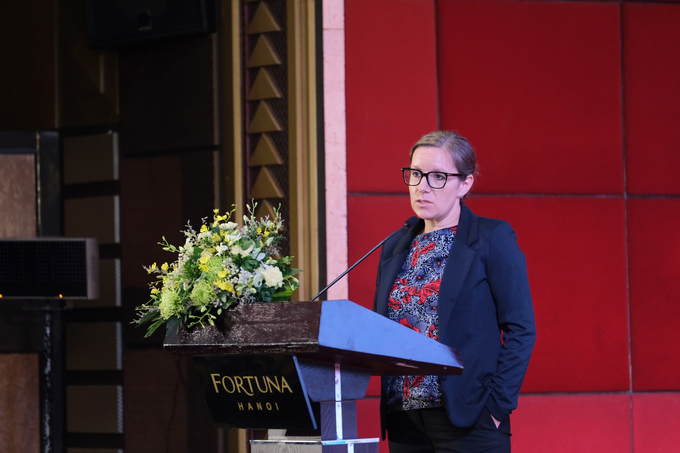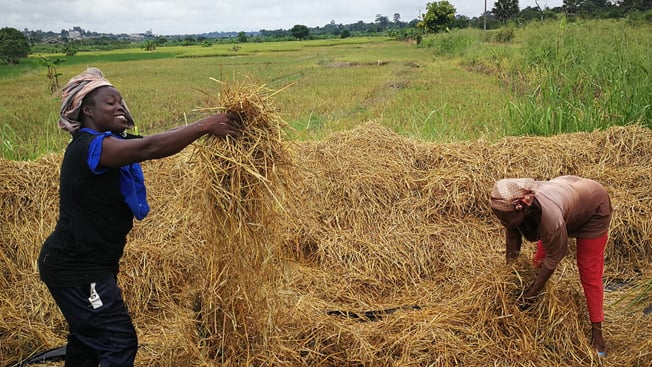November 26, 2025 | 20:02 GMT +7
November 26, 2025 | 20:02 GMT +7
Hotline: 0913.378.918
November 26, 2025 | 20:02 GMT +7
Hotline: 0913.378.918

Ms. Sonja Esche, the Agricultural Team Leader of the German Corporation for International Cooperation (GIZ) speaking at the conference. Photo: Quynh Chi.
Ms. Sonja Esche, the Agricultural Team Leader of the German International Cooperation (GIZ), highlighted the close collaboration with MARD in the area of agriculture and food sector transformation by implementing the Green Innovation Center (GIC) Project, an initiative by the German Government. It is a global program, concentrating on the innovative and sustainable transformations of the Agriculture and Food Sector across 16 countries (14 on the African Continent and 2 from Asia) and 21 value chains.
The GIC project in Vietnam focuses on the broad-scale adoption of innovations among small-scale farmers and up- and downstream enterprises in the rice and mango value chain through innovative agricultural technologies, and sustainable farming practices. The aim is to not only boost income and employment, but also to reduce environmental pressures, reduce greenhouse gas emissions, and so to foster more sustainable value chains. With that, the project is supporting MARD in its strategy to transition to a climate resilient, high quality and low emission rice sector and support Viet Nam in achieving its Net Zero 2050 target.
As part of this, GIZ also had the opportunity to support MARD in their efforts on the topic of South South Cooperation. Being a global programme, exchange between the 16 countries involved came naturally and it started quite small with technical exchanges between practitioners on the differences of the rice value chain in the different countries. Over time, more colleagues got interested and wanted to be involved and the topic of South South Cooperation and it became more prominently in the project implementation.
So far, a true highlight was the South-South exchange visit of the Global Green Innovation Center's rice working group in May 2023 with over 30 representatives from 5 different African countries coming to the Mekong Delta. This exchange, organized with support from MARD and DARDs allowed for practical and hands on sharing of knowledge and experience on the factors contributing to the success of Viet Nam's rice sector. The collaboration, networks and friendships that have evolved out of this, are remarkable.
GIZ highlightes the importance of dialogues such as this conference today between the different partners to share, discuss and learn from each other. As a mutual understanding and equal partnership is important for a successful South-South Cooperation and so food security and sustainable development.
" This workshop presents an great opportunity for Vietnam and several different African countries to share experiences and discuss the potential for a future collaboration", Ms. Esche emphasized.

Vietnam is a trustful and active partner in the global efforts to eradicate famine, reduce poverty, and develop rural agriculture. Additionally, it is a significant contributor to the provision of agricultural technology in Africa. Photo: UN.
The advantages of South-South cooperation aren't limited to the increase in rice productivity; they also extend to the enhancement of farmers' resilience to climate change and their quality of life. Nevertheless, in order to be truly effective, it is imperative to enhance funding, develop the capacity of organizations and individuals to engage in research and development, and effectively coordinate among stakeholders. Additionally, it is imperative to prioritize the promotion of South-South commerce and the utilization of digital technology in order to elevate the prestige and potential of collaboration.
Above all, South-South cooperation not only benefits the participating countries but also significantly contributes to the millennial objectives of reducing the flow of illegal migration, ensuring global agricultural security, and promoting political stability. Consequently, Vietnam is a trustful and active partner in the global efforts to eradicate famine, reduce poverty, and develop rural agriculture. Additionally, it is a significant contributor to the provision of agricultural technology in Africa.
Translated by Linh Linh

(VAN) The Disaster Prevention Community Fund has mobilized resources to install automatic rain gauge and flood warning stations, helping localities proactively respond to natural disasters more effectively.

(VAN) Thanh Hoa province has substantial potential to supply carbon credits, opening opportunities for green economic development, enhancing agriculture and forestry value.
/2025/11/25/1741-0-nongnghiep-221736.jpg)
(VAN) The application of AI helps identify emission sources and assess air pollution developments, thereby supporting management agencies in issuing timely and appropriate control policies.

(VAN) Viet Nam will develop its carbon market not only by prioritizing transaction volumes but also by transitioning to a low-emission economy.
/2025/11/25/3413-1-171953_261.jpg)
(VAN) Experts from the Vietnam Academy of Science and Technology have conducted surveys to identify the causes of landslides in Lam Dong province and propose natural disaster prevention solutions.

(VAN) The HNT reservoir operation support system, developed by WeatherPlus in collaboration with Kyushu Electric Power, enables real-time rainfall forecasting, inflow forecasting, and flood-release simulations.

(VAN) Dr. Cao Duc Phat stated that the localization of early natural disaster warning technologies will help meet practical requirements and create favorable conditions for domestic research institutions and businesses to develop.